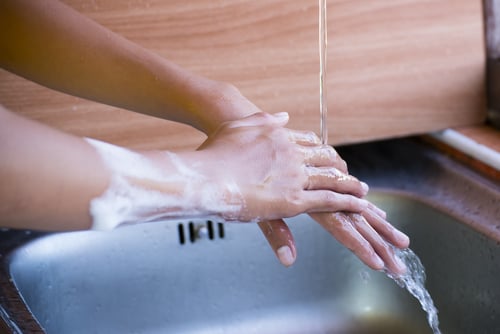
May 8, 2025
Regular Soap is Healthier and Safer than Antibacterial Soap?
SHARE
When buying soap, most people subconsciously reach for antibacterial soap without giving it a second thought. They believe that antibacterial soap is better than regular soap because it kills germs.
The FDA, however, has a different opinion. Scientists have yet to find evidence that antibacterial soaps are any better than regular soaps. Some studies have actually shown that antimicrobial ingredients can have negative health effects.
This is why the FDA recently banned 19 chemicals that are used in these soaps. The ban includes triclosan, the most common antiseptic in hand soaps.
(By the way, according to the Mayo Clinic, triclosan is also found in certain older cookware, furniture, and toys to prevent or reduce bacterial contamination. Research has shown that it can be hazardous to human health and harmful to the immune system. It’s even been shown to affect hormone regulation in animals.)
Antibacterial Soaps Have to Adjust to New Regulations
Manufacturers have no choice but to remove the banned chemicals from their soaps. And while there are three chemicals that haven’t been banned – mainly because they are still under study – manufacturers have a limited amount of time to submit data on the safety and effectiveness of these ingredients to the FDA.
However, there’s absolutely no reason to worry. Regular soap and water are all you need to avoid spreading germs and getting sick.
Soap doesn’t have to kill germs to be effective; it just has to physically remove them from your skin!
As you go about your day, bacteria and viruses stick to the oil on your hands. Soap works by chemically breaking down the oil and “freeing” the microbes so that they can be rinsed away easily.
The more soap you use and the longer you scrub your hands, the cleaner your hands will be. This is why the CDC recommends scrubbing your hands for at least 20 seconds at a time before rinsing them.
Why Regular Soap is Healthier
Using regular soap is actually better for your health.
Antimicrobial soaps contain chemicals that cause mutation of bacteria and contribute to the rise of antibiotic-resistant bacteria. These ingredients have also been known to cause allergies and disrupt hormonal processes.
Triclosan, for instance, has been detected in the urine, blood, and breast milk of people who use antibacterial soap. Studies have also shown that it can disrupt hormonal processes and impair muscle function by hindering muscle contractions at a cellular level. That’s a high price to pay for something that doesn’t even work!
What are the Alternatives?
You only need regular soap and water to stay clean and germ-free. However, since the effectiveness of hand-washing depends on how long you scrub, an alcohol-based hand sanitizer can come in handy when you’re “out in the wild.”
Hand sanitizers that don’t contain any of the banned ingredients will still be available in the stores. They’re also safer, healthier, and just as effective as antibacterial washes.
